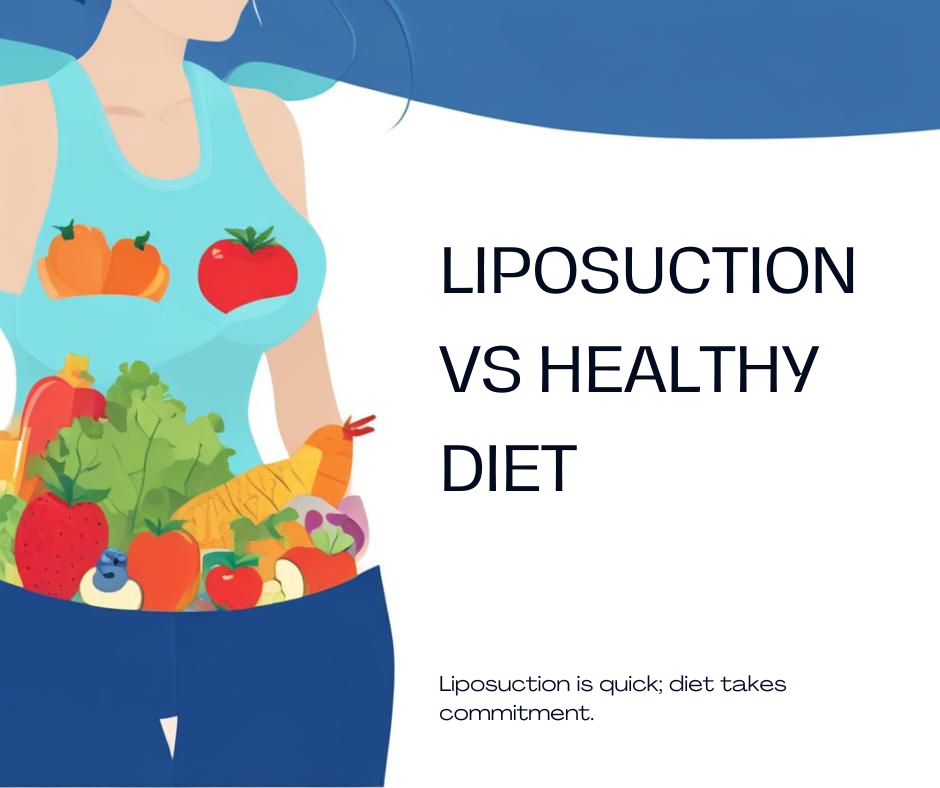
In an age where obesity has reached epidemic proportions, many individuals find themselves exploring various solutions to achieve fat loss. Two common approaches dominate the conversation: liposuction and maintaining a healthy diet. But which is better? Which provides sustainable, long-term benefits, and which is right for you?
This comprehensive article explores the pros, cons, and science behind both liposuction and dietary changes, helping you make an informed, safe, and effective choice in your fat loss journey.
Liposuction: A Surgical Shortcut or Metabolic Booster?
Liposuction is a cosmetic surgical procedure designed to remove localized fat deposits. Among the techniques available, VASER liposuction has gained popularity for its precision and minimal invasiveness. More than a body contouring tool, emerging studies suggest liposuction may have metabolic benefits.
The Science Behind Liposuction
Recent studies—including those by Gibas-Dorna et al. (2017) and Hasan Ali (2025)—demonstrate improvements in lipid profiles and insulin sensitivity in patients undergoing VASER liposuction. According to Ali’s retrospective study, patients with a BMI >30 who followed dietary recommendations postoperatively showed significant reductions in triglycerides and fasting glucose levels.
Further, Farhan et al. (2025) showed that massive liposuction (removal of over 5 liters of fat) led to significant changes in key metabolic markers such as leptin, adiponectin, resistin, and insulin, indicating improved glucose metabolism and insulin sensitivity.
Key Benefits of Liposuction:
- Immediate results: Visibly reduces fat in targeted areas.
- Improved insulin sensitivity: Lower insulin and leptin levels post-surgery.
- Enhanced self-esteem: Positive impact on mental well-being.
Limitations and Risks:
- Not a weight loss solution: Primarily for contouring, not reducing BMI significantly.
- Surgical risks: Includes infection, scarring, and uneven fat removal.
- Temporary benefits: Metabolic gains may not last without lifestyle changes.
Healthy Diet: A Holistic and Sustainable Approach
A healthy diet rich in whole foods, lean proteins, healthy fats, and complex carbs can promote gradual and sustainable fat loss. While not as rapid as liposuction, dietary changes have proven long-term benefits for metabolic health.
Metabolic Benefits of a Healthy Diet
Diets high in fiber, low in refined sugars, and balanced in macronutrients have been shown to:
- Improve blood glucose regulation
- Reduce LDL cholesterol
- Enhance adiponectin levels, which supports insulin sensitivity
- Maintain leptin balance for appetite control
Unlike liposuction, which removes fat cells, a healthy diet prevents fat accumulation by optimizing internal metabolism.
Key Benefits of a Healthy Diet:
- Long-term sustainability: Encourages healthy habits and lifestyle.
- Zero surgical risk: No anesthesia, no downtime.
- Improves overall health: Cardiovascular, cognitive, and digestive health.
Challenges:
- Slow results: Requires consistency and patience.
- Behavioral change: Needs long-term commitment and discipline.
- Temptation and setbacks: Social eating and stress can derail progress.
Choosing What’s Right for You: Practical Advice
Here are actionable guidelines to help you choose between liposuction and a healthy diet:
1. Assess Your Goals
- If your goal is quick body contouring for aesthetic reasons, liposuction might be suitable.
- If your goal is sustainable fat loss and long-term health improvement, a healthy diet is the best route.
2. Consider Your Medical Profile
- Liposuction may offer short-term metabolic boosts for those with insulin resistance or high triglycerides, especially when paired with dietary changes.
- Individuals with heart conditions or who are unfit for surgery should opt for diet-based interventions.
3. Combine Both for Maximum Impact
Research shows that liposuction paired with proper nutrition results in greater metabolic improvement and weight maintenance. A holistic approach—starting with liposuction and continuing with a disciplined diet—can provide the best of both worlds.
4. Consult Professionals
- Speak to a board-certified plastic surgeon for liposuction guidance.
- Consult a registered dietitian or nutritionist to create a personalized meal plan.
Conclusion
When comparing liposuction vs a healthy diet, the best choice depends on your goals, health condition, and lifestyle. Liposuction can deliver immediate visual improvements and even temporary metabolic benefits, but it is no replacement for the long-term benefits of a healthy diet.
For sustainable results, consider a combination of both—use liposuction as a catalyst and adopt a healthy diet to maintain and build on those gains. Always consult healthcare professionals before making decisions that impact your health.
